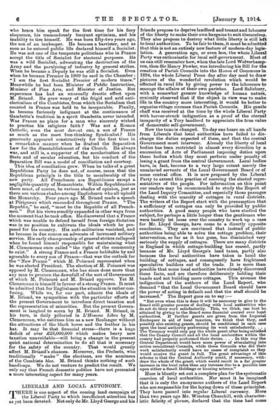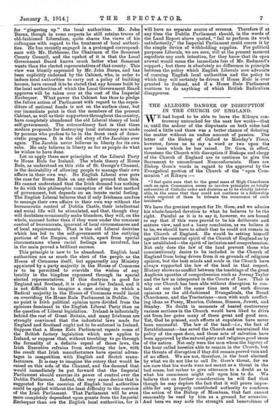LIBERALS AND LOCAL AUTONOMY.
THERE is one aspect of the coming land campaign of the Liberal Party to which insufficient attention has as yet been. devoted. Not only do Mr. Lloyd George and his friends propose to deprive landlord and tenant and labourer of the liberty to make their own bargains to suit themselves. They also propose to destroy what little liberty is still left to local authorities. To be fair to them, it inset be admitted that this is not an entirely new feature of modern-day legis- lation. A generation ago, or even less,-the whole Liberal Party was enthusiastic for local self-government. Most of Us can still remember how, when the late Lord Wolverhamp- ton, then Sir Henry Fowler, was introducing his Bill for the creation of Parish Councils into the House of Commons in 1894, the whole Liberal Press day after day used to draw pictures of the wonderful revolution which would be effected in rural life by giving power to the labourers to manage the affairs of their own parishes. Lord Salisbury, with a somewhat greater knowledge of human nature, cynically observed that if the object in view was to make life in the country more interesting, it would be better to organizevillage circuses than Parish Councils. His gentle chaff was received at the time by the whole Liberal Party with horror-struck indignation as a proof of the eternal incapacity of a Tory landlord to appreciate the true value of democratic self-government. Now the tumour changed. To-day one hears on all hands from Liberals that local authorities have failed to dis- charge the duties expected of them, and that the central Government must intervene. Already the liberty of local bodies has been restricted in almost every direction by a succession of Acts of Parliament imposing duties upon these bodies which they must perform under penalty of losing a grant from the central Government. Local bodies have, in fact, become to a very large extent merely the unsalaried servants of the Local Government Board or of some central office. It is now proposed by the Liberal Party to extend this practice of coercing the elected repre- sentatives of the people. For information on this point our readers may be recommended to study the Report of the Land Inquiry Committee, and especially those passages dealing with the scarcity of cottages in rural districts. The writers of the Report start with the presumption that a sufficiency of cottages can only be provided by public authorities. A good many people who have studied the subject, for perhaps a little longer than the gentlemen who were hastily let loose over the country to work up a. case for Mr. Lloyd George, have come to a directly opposite conclusion. They are convinced that instead of public authorities being able to solve the cottage problem, their intervention, so far as it has gone, has diminished very seriously the supply of cottages. There are many districts in England in which cottage-building has ceased, partly because of Mr. Lloyd George's land taxes, partly also because the local authorities have taken in hand the building of cottages, and consequently have frightened speculative builders out of the trade. It is more than possible that some local authorities have already discovered these facts, and are therefore deliberately holding their hands and not building more cottages. This arouses the indignation of the authors of the Land Report, who demand "that the Local Government Board should have the power of acting in default and that the staff should be increased." The Report goes on to say :— "But even when this is done it will be necessary to give to the Board still greater powers of dealing with local authorities who do not do their work satisfactorily. This, we think, can best be attained by giving to the Board some financial control over local authorities. If further grants are given from the Imperial Exchequer in aid of local taxation, we think that they, and possibly also existing .grants, should be conditional in each ONO upon the local authority performing its work satisfactorily. . . The Treasury would only pay the whole grant after being satisfied that the County Council and all the local authorities within the county had properly performed their duties. . , . In this way the Central Department would have more power of stimulating into action recalcitrant Councils, while those Councils who did their work satisfactorily would have no cause of complaint as they would receive the grant in ful/. The great advantage of this scheme is that the Central Authority could, if necessary, with- draw the whole of the grant, which would result in a far greater increase in the local rates than any increase duo to a possible loos upon either a Small Holdings or housing schema" Here is bluntly set out a complete plan for the systematic coercion of local authorities. Nor must it be imagined that it is only the anonymous authors of the Land Report who are responsible for the laying down of these principles. They have passed into regular Liberal currency. More than two years ago Mr. Winston Churchill, with character- istic felicity of phrase, declared that. the time had come for "gingering up" the local authorities. Mr. john Burns. though in some respects he still retains traces of old-fashioned Liberalism, quite shares the views of his colleagues with regard to the treatment of local authori- ties. He has recently engaged in a prolonged correspond- ence with Mr. Hobhouse, the Chairman of the Somerset County Council, and the upshot of it is that the Local Government Board knows much better what Somerset wants than the elected representatives of that county. This view was bluntly expressed by Mr. John Bums, and has been explicitly endorsed by the Cabinet, who, in order to induce local authorities to carry out a policy of building houses, have caused it to be stated that any houses built by the local authorities of which the Local Government Board approves will be taken over at the cost of the Imperial Exchequer. What power the Cabinet has thus to pledge the future action of Parliament with regard to the expen- diture of national funds is not on the surface clear, but our immediate point is that the members of the present Cabinet, as well as their supporters throughout the country, have completely abandoned the old Liberal theory of local self-government. The extraordinary fact is that these modern proposals for destroying local autonomy are made by persons who profess to be in the front rank of demo- cratic progress. It is the old story of the Jacobins over
i
again. The Jacobin never believes n liberty for its own sake. He only believes in liberty so far as people do what he wishes to have done.
Let us apply these new principles of the Liberal Party to Home Rule for Ireland. The whole theory of Home Rule, as understood on this side of St. George's Channel, is the desirability of allowing people to manage their own affairs in their own way. No English Liberal ever puts the case for Home Rule on any other ground than this. He cannot understand that the Irish demand has nothing to do with this philosophic conception of the best method of government, but depends on an innate racial feeling. The English Liberal believes that if only Irishmen arefree to manage their own affairs in their own way without the bureaucratic control of Dublin Castle, their intellectual and social life will be stimulated, and that, though they will doubtless occasionally make blunders, they will, on the whole, succeed better than if they were under the constant control of bureaucrats, ignorant of local circumstances and of local requirements. That is the old Liberal doctrine which has led to the self-government of the outlying portions of the Empire, and which, apart from special circumstances where racial feelings are involved, has in the main proved a brilliant success.
This principle is now to be abandoned. English local authorities are as much the elect of the people as the House of Commons itself, but apparently any Ministry appointed by a party majority in the House of Commons is to be permitted to override the wishes of any locality in the kingdom expressed through its special elected representatives. If this doctrine is good for England and Scotland, it is also good for Ireland, and it is not difficult to imagine a case arising in which a Radical majority in the House of Commons would insist on overriding the Home Rule Parliament in Dublin. On no point is Irish political opinion more divided from the opinions dominant in the English Liberal Party than on the question of Liberal legislation. Ireland is industrially behind the rest of Great Britain, and many Irishmen are strongly convinced that the industrial laws made for England and Scotland ought not to be enforced in Ireland. Suppose that a Home Rule Parliament repeals some of the British factory legislation which now applies to Ireland, or suppose that, without troubling to go through the formality of a definite repeal of those laws, the Irish Executive refrains from enforcing the law, with the result that Irish manufacturers have special advan- tages in competition with English and Scotch manu-
facturers. -
facturers. It s easy to imagine the outcry that would be raised on thie side of the Channel, and the demand that would immediately be put forward that the Imperial Parliament should exercise its power of control over the Dublin Parliament. Indeed, the very same device that is suggested for the coercion of English local authorities could be applied without the least difficulty to the coercion of the Irish Parliament. That Parliament will be even more completely dependent upon grants from the Imperial Exchequer than are the English local authorities, for it will have no separate source of revenue. Therefore if at any time the Dublin Parliament should, in the words of the Land Report above quoted, " fail to perform its work satisfactorily," the Imperial Parliament could coerce it by the simple device of withholding supplies. For political purposes Liberals, we are sure, will at the present moment repudiate any such intention, for they know that its open avowal would mean the immediate loss of Mr. Redmond's support ; but there is absolutely no difference in principle between the policy which English Liberals now advocate of coercing English local authorities and the policy to which they will certainly be driven if Home Rule is ever granted to Ireland, and if a Home Rule Parliament ventures to do anything of which British Radicalism disapproves.



















































 Previous page
Previous page